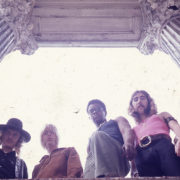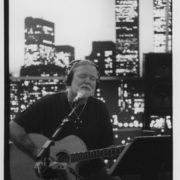In honor of Gregg Allman’s 70th Birthday – full 2001 Interview
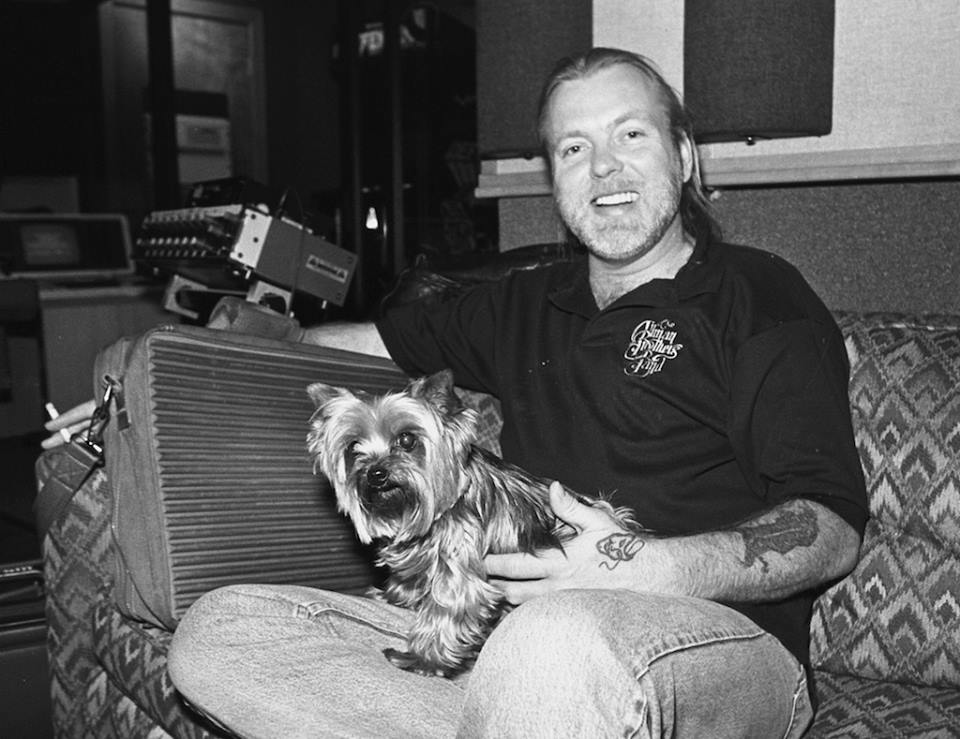
Gregg and Jazzy. Foto – Kirk West
I interviewed Gregg for a Hittin the Note cover story in 2001. I was supposed to fly down to his then-new home in Savannah but t we ran out of time and it became a phone interview conducted shortly after the March 2001 Beacon run that saw Warren Haynes performing as a member for the first time in almost four years. Though we couldn’t have known it at the time, it was the birth of a great era in the Allman Brothers Band, the lineup that would last the final 14-plus years, making them by fat the longest lasting version of the great band. Presented today in honor of Gregg’s 70th birthday.
*
Gregg Allman is a changed man, a fact abundantly clear to anyone who’s seen him perform recently. Gone is the guy who sat hunched over his organ, sometimes appearing to barely be part of the Allman Brothers Band when he wasn’t actually singing. In his place is a lively, engaged keyboardist and a singer whose range and full depth of emotion have returned to a voice that never lost its whiskey blues growl. It is once again clear to anyone really listening that Gregg is one of the finest singers rock music has ever produced, and he has also become an increasingly vibrant musical force on his Hammond organ.
As apparent as Gregg’s transformation has been over the past several years, its full depth didn’t strike me until I spoke to him for this interview. I have interviewed Gregg numerous times and have chatted with him at shows countless others. While past interviews with Gregg have been very successful, with him offering some candid insights into his 30-plus year career, never before has he exhibited such a crispness of thought. He speaks more quickly and even his speaking voice has changed, becoming slightly higher and less gravelly.
Clearly, going sober five years ago has agreed with him in a profound manner, as has his relationship with Stacy Fountain, the longtime girlfriend who recently became his wife, and who played a crucial role in helping him decide to go straight.
With a new marriage, a new house in a new city – Savannah, Georgia – and a new incarnation of the Allman Brothers Band featuring Warren Haynes, ready to take to the road for the summer, there’s plenty to talk to Gregg about. And he was more than happy to discuss it all.
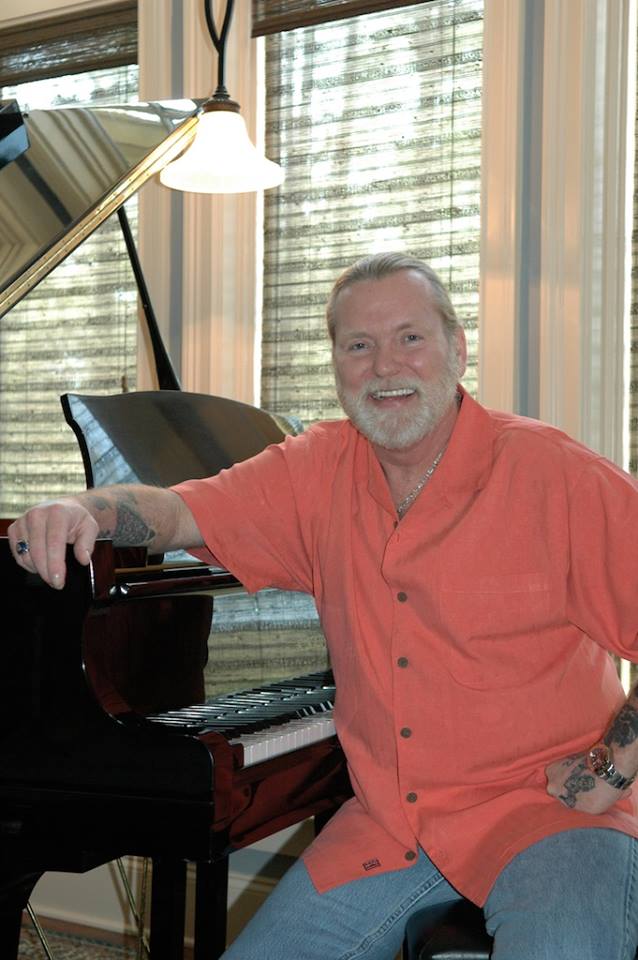
At home, 2005. Foto – Kirk West
ALAN PAUL: You moved to Savannah recently after many years in the San Francisco Bay Area. How are you enjoying life as a Southern gentleman?
GREGG ALLMAN: [laughs] Oh, I love it here. I just love Savannah. We knew we wanted to go to either the coast of Georgia or the coast of South Carolina. So we made two or three trips from Marin County, where we lived, and one time on the way back Stacey was reading something on the plane that said the two most sought-after places to live in were Marin and Charleston, South Carolina. So, bam, we moved further down South. We were trying to get away from the crowds, and we did it.
We live way out in the country. We’re out here with all these huge oak trees dripping with Spanish moss, all this virgin timber, and it’s really beautiful When it gets dark around my house, it gets dark. There are no streetlights, and we live right on the river. And I have this great landscaper and we have all these beautiful, fragrant flowers. It’s great, man.
Have you always preferred a more peaceful, country life to a more urban one?
I get enough urban life on the road, especially back in the days when we toured two or three times a year, back to back. But when you’re young, you’re afraid you’re going to miss something. When I was sowing my wild oats and what have you, I didn’t take much time to stop and smell the roses. And I certainly am doing so now. Ever since I got sober, all five of my senses are waking up and I’m appreciating them all.
You are now in your fifth year of being sober, right?
I started getting sober in 95 and I think I finally got a hold of it in 96 and it just gets better every year. I would recommend it to anybody.
You are still marveling at the improvements it has brought to your life. Do you ever start taking simple things like being able to smell and taste better for granted?
[laughs] No. There’s a whole lot of stuff that I used to take for granted that I don’t anymore, and one of them is being alive. I’ve come so close, but we won’t get into that. I don’t know… It all pretty much seems like a dream, or something that happened to some one else. Just that life of day in and day out, being wasted. I don’t miss it,for sure. It’s like it never happened almost except I can remember feeling like hell. Oooh, I can remember that. I can remember the taste I had in my mouth in the morning. Many mornings I’d wake up and think, “Oh, boy, thanks a lot.” [laughs]
Why do you think it worked this time as opposed to the others?
I started trying to get sober when I was 32. Hell, it took me almost 20 years to get sober. Hmmm. I don’t know why it took now. I’ve really come to believe in things happening for a reason. My wife is really into Edgar Casey and she’s been turning me onto some of that stuff. Like, there are no accidents. That one is kind of hard to swallow, but I can see how things just kind of take shape. They happen when they’re supposed to happen even though you probably think it ain’t the time. I believe in a higher power for sure, and I’m not giving you some AA jargon, either, because personally… well, we won’t say anything about them, either way, okay?
The last time I saw you yo proudly pulled a picture of your Harley out of your wallet to show me. Tell me about your bikes.
I’ve had motorcycles all my life, and I have some nice ones now. My newest one is a 99 Diamond Wide Glide with one of those new rubber mounted twin cam engines and it is incredible. God is it fast.
And then my favorite, which is the one I showed you, I believe, is a 95 fat boy but the only part that’s still a fat boy is the frame and the low end of the engine and that’s about it. Ron Sims built it out in Oakland, when I lived out there. Jim Horst painted it, and you wouldn’t believe what it looks like. It’s got what they call digital flames. [laughs] It’s blue and grey and black. It’s got a mushroom on the front and black fender, though they’re deep in the paint so no one will recognize that.
Stacey, my wife, has a Sportster 883 hugger and she loves it, man. She rides the hell out of it. It’s great seeing that little 5-2 girl with hair down to her butt driving a Harley. There’s something about seeing a woman playing the bass or driving a Harley that just does something to me, man. I don’t know why.
And you also have a new Vette I’ve been hearing about.
I’ve always loved automobiles and motorcycles. I have a 2000 and boy is it something else. I think it’s my sixth one and this is what they call a fifth generation Corvette. It’s nothing like any Corvette I’ve ever had. It’s got 380 horsepower and I had some exhausts put on it. Oh, it’s sweet, man. We took it down to Daytona to see my mother a couple weeks ago. The thing just purrs along at 80 and is really ready to go from there. I’ve already taken it in my stride that I’ll be getting two, three tickets, but so far, so good. We live way out in the country here anyhow.
How did you enjoy playing with Warren Haynes again at the Beacon?
That was such a kick and I’m really looking forward to this summer. Before we went to the Beacon, he came down here to my house for three or four days and we wrote some songs together and he got to unwind from that schedule he keeps. Hell, he slept half the time. [laughs] You can do some hardcore sleeping at my house. Ask anybody that’s been here. And we ripped out about three real good ones, which then really came to life at the Beacon. Playing the songs really works that way. I think it’s because the people being there kind of scare you into doing it right. When we introduce a new song, man you talk about being aware of the audience. I have terrible stage fright, anyhow.
You still do, after all these years?
Oh yeah, oh yeah. I start sweating when I get out of the bath and it doesn’t go away until I’m maybe halfway through the first verse of the first song. Then it’s just over and gone, man. I think if I didn’t have it, something would really fiercely go wrong. It’s a pretty ridiculous syndrome at this point, but I guess it’s just meant to be. I’ve just learned to accept it and the only time it returns after the very beginning is when we introduce a new song. At times like that, you can’t shut the audience and their presence out, So you just roll your eyes back in you head and sing for the Gods and the people just happen to be there. That’s not an original line by the way. Some old blues guy told me that a long time ago. The truth is, the people give you the energy to deal with your doubts.
What was the process of writing these songs with Warren like? Did one of you bring in lyrics or music and then work them out together, or what?
There’s no process. I wish there was, but there’s as many ways to write songs as there is songs. You have to feel comfortable. Once you get in a groove, you flow along with the tune, but it’s finding that groove that’s the hard part, and I haven’t found that many people I really enjoy writing with. It’s real easy with Warren, and each of the songs came about in a different way.
For instance, we were writing one and got stuck. I went to bed and he stayed up, talking to his wife on the phone. Then he sat down at the piano and found something sitting there that I had been working on myself a few days earlier and fit right in and got us unstuck. I had written it, but hadn’t even thought about it for this particular song.
Do you usually write on piano or guitar?
I have both of them sitting right in the living room and I just walk in there and grab what seems right. The good thing about a guitar is you can take it anywhere, but the thing about a piano is it seems like you get more chordal voicings and options, so I guess I prefer to write songs on the keyboard. But the guitar certainly has its place. For instance, “Melissa” played on a piano… I’m sorry, no. it just ain’t happening. And the only song I’ve ever written on a Hammond is “Dreams.”
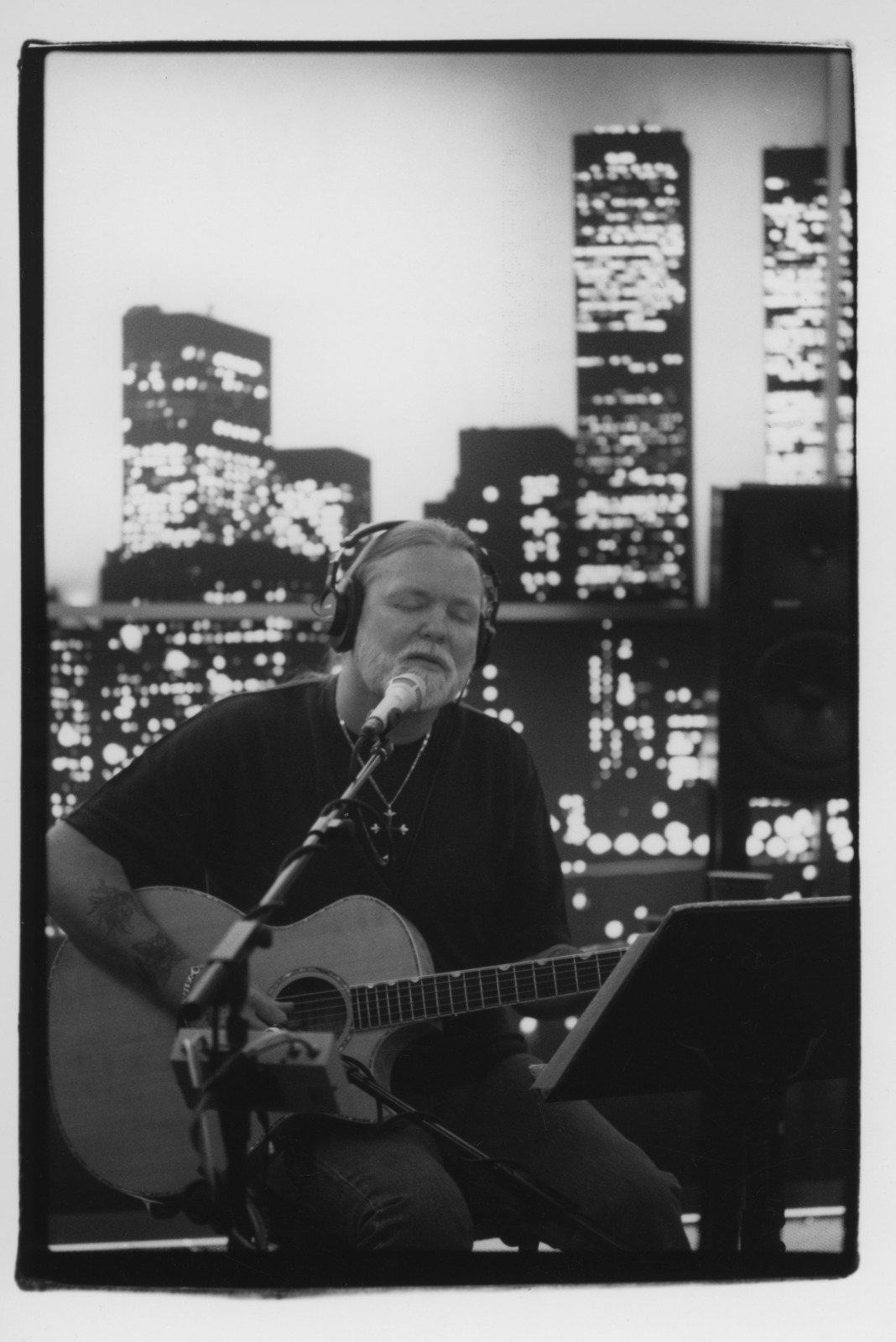
Sirius Studios – Foto- Kirk West
You once told me that threw out at least 250 songs before you wrote “Melissa.”
Exactly. You write a lot of bad ones, man, until you hit something. I kept “Melissa” in a bag for along time, from when I wrote it in about ’67 until we were recording Eat a Peach in 1970. It was one of my brother’s favorite songs, but I didn’t think it fit in the band, but after he died, we were trying to finish up the album and we came up with three songs: “Melissa,” which I finally used, “Ain’t Wastin Time No More,” which I wrote for him and then one that Dickey Betts wrote, “Les Brers.”
And the album ends with the only song Duane ever wrote, “Little Martha” which is such a beautiful song and it sounded so different. Was it typical of things he would play by himself on acoustic guitar?
Absolutely. He used to play stuff like that all the time. That was just this little lick that he had and over a period of about four years I watched him develop into a beautiful song. There would have more like it, I’m sure.
I once heard Leo Kottke play it and he introduced it by saying something like, “I cried when I heard this song because Duane Allman had written the song I always heard in my head but hadn’t yet figured out how to play.
Wow. That’s pretty heavy.
Another acoustic player you’ve expressed your admiration for in the past is Tim Buckley.
Yeah, he had a big influence on me, as did people like Jackson Browne, who I roomed with for a while out in California. See, when I first got out there, all I had known was r&b and blues and these guys sort of turned me on to a more folk approach. I learned to Travis pick and even wear steel fingerpicks, which I still do, though I’m sort of rusty because you have to do it all the time. I found all that really interesting and then I sort of developed my style from combining these things together — sort of folky sounding songs with soulful style vocals. It’s hard to say what would have been, but I don’t think I would have written songs like “Multi Colored Lady” or even “Midnight Rider” if I hadn’t gotten involved with the acoustic guitar.
And I still really like to play it, though me and electric guitars, we parted ways. It’s like having a dragon on a leash. Those things scare me. You can’t make up for talent and chops with volume., I will guarantee you that. I mean, I understand about tone and all that. And don’t get me wrong, I understand that a really, really good guitar player adds a hell of a lot to a group. It’s just that guitar players are so crazy, man
One of the things I noticed at the Beacon is the volume is down with this new lineup and…
Finally, after 30 years!
And one of the things I noticed is you’re playing a much more aggressive organ and I was wondering if getting sober had reenergized that, or I could just hear it more now with everything down a notch.
It’s both, actually. A whole lot of both.mIt’s amazing how having a band is almost like having a relationship with a woman. I don’t know if you’ve ever been in a real bad relationship, but it’s amazing how little by little you learn to live with somebody who’s absolutely dragging you down and your whole environment is kind of twisted and you don’t even realize it until it’s stopped. Lots of things have changed now that peace of mind abounds, and all the changes have been for the better.
Change is inevitable, but shocking for an institution such as yours.
Oh, yeah, man. It’s definitely hard to maintain a band for 30 years for many, many reasons. It’s a give and take thing, which is why I refer to it so being so similar to a marriage relationship. It’s a thing that has to maintain a balance or everyone suffers. This band has been so stifled, but that’s history and that’s the best part of it.
Has it been hard being the only Allman in the Allman Brothers Band for all these years?
Yeah, it has. And now even more so in a way. See, the drummers are back there behind me and I’m on the line. One night at the Beacon, I looked down and realized I was the only one left on the frontline. I guess it makes me appreciate the whole thing even more, really. It’s hard to stick together, and that’s probably why a lot of other good bands don’t hang around.
My brother, Woody, Oakley, they can’t be replaced because they were all unique individuals, but it doesn’t mean the whole shebang has got to fold. We still have music left to play
And how does having Warren in the band change things?
Well, first of all, we have another singer. And he’s great to sing harmony with, either part, lead or harmony. He phrases quite a bit like me, so it’s just really a pleasure. And I love his guitar playing. It’s not too much; he doesn’t put a fill in every phrase. He doesn’t play just to hear himself. And he helped everyone come together, I think. The whole band was really tight at the Beacon.
And you had Chuck Leavell back on stage for the first time in a long, long time.
That was another kick. He’s turned into a really, really neat guy., and, of course he’s a phenomenal player. It felt like a damn orchestra, man, which in actuality we did have when the horn players joined us. Which was another kick. I love horn sections, man. Back in ‘74, I took out the big orchestra and ever since then I’ve been really wanting to do it again. Now that I’m a much more seasoned player and performer and I’m sober I can appreciate it a lot more and I just might do that again. It’s not really economically feasible, but I might do it anyhow.
That would be great. You seem to be on a real roll right now.
Yes, and I believe that writing these tunes with Warren brought me out of my slump. As a matter of fact, I know it did and I am so glad. I have quite a few projects going here and I’m ready to roll.
So are we going to be seeing a new album soon?
Oh, you bet you. One of each, actually – a Brothers album and a solo album. Probably the Brothers album will come first, because it’s getting to the past-due stage. We’ve put so much live stuff out and it’s really just past time to get into the studio.
Was it always your goal on solo albums to develop aspects of your muse not really explored in the Allman Brothers?
Absolutely. It’s like an open field. You don’t have to do anything. With the Brothers, what you hear on stage and record have always been pretty much the same thing, but with my own records, I feel more free about sweetening it with strings and voices, or to go the other way, and just have just my acoustic guitar and my voice. And a lot of it was just and adventure to see how I would like it. There’s always something else to try.



